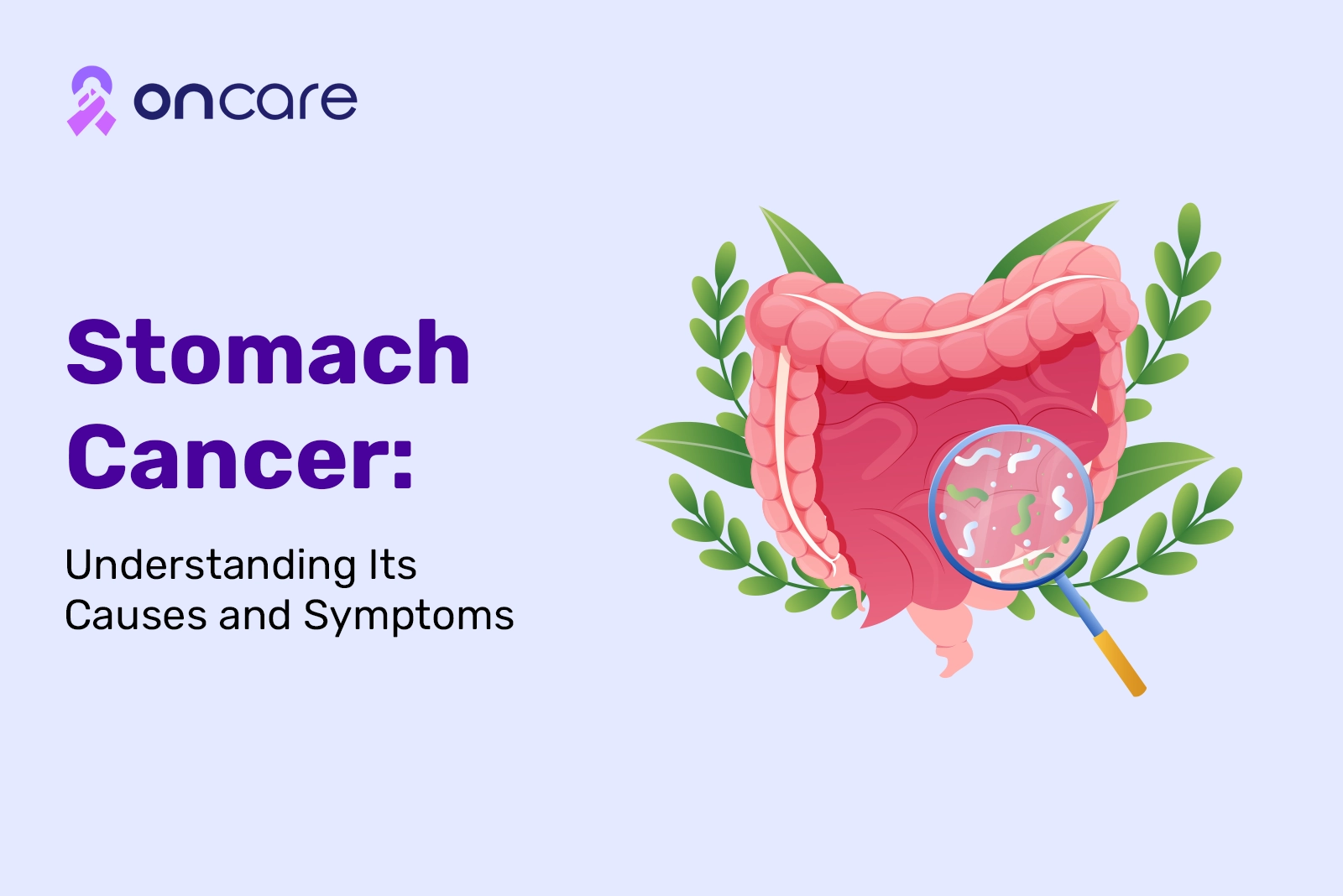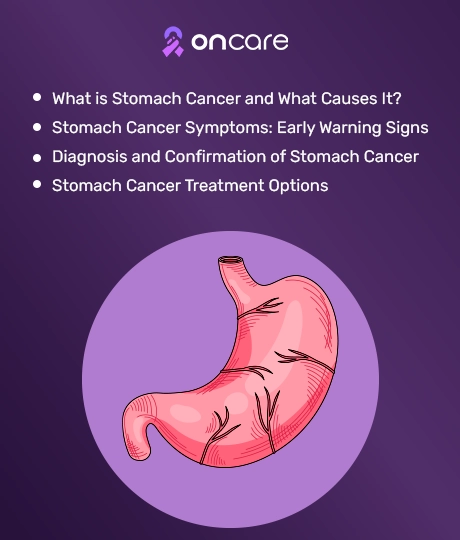Stomach Cancer: Understanding Its Causes and Symptoms

Stomach cancer, also known as gastric cancer, is a significant health concern worldwide. Despite advancements in early detection and treatment, stomach cancer remains one of the leading causes of cancer-related deaths. At Oncare, we are committed to providing comprehensive cancer care with a focus on early diagnosis, affordable treatments, and expert guidance throughout your journey. Our experienced oncologists specialize in treating stomach cancer with state-of-the-art technology, helping you receive the care you deserve.
In this article, we will explore the causes, symptoms, and effective ways to detect and manage stomach cancer, with a special emphasis on Oncare’s approach to treatment.
What is Stomach Cancer and What Causes It?
Stomach cancer, or gastric cancer, refers to the uncontrolled growth of abnormal cells in the lining of the stomach. It can develop in any part of the stomach, but it most often begins in the cells that produce mucus, known as the mucosa. The exact cause of stomach cancer is not completely understood, but several risk factors contribute to its development.
Helicobacter pylori Infection
Helicobacter pylori (H. pylori) infection is one of the most well-known causes of stomach cancer. This bacterium causes chronic inflammation in the stomach lining, which can lead to ulcers and, over time, increase the risk of developing gastric cancer symptoms. The World Health Organization (WHO) has classified H. pylori as a Group 1 carcinogen, meaning there is strong evidence that it can cause cancer in humans.
Diet and Lifestyle Factors
Diet plays a critical role in the development of stomach cancer. A diet high in processed foods, salted or pickled foods, and smoked meats, as well as low in fruits and vegetables, can increase the risk. Research suggests that these dietary habits can increase the levels of nitrates and other harmful substances in the stomach, which may promote the development of cancer.
Genetic and Family History
Genetic factors can also contribute to the development of stomach cancer. A family history of stomach cancer increases an individual’s risk, particularly if a first-degree relative (such as a parent or sibling) has had the disease. Some inherited genetic mutations, such as those in the CDH1 gene, are associated with an increased risk of hereditary diffuse gastric cancer, a rare form of the disease.
Age and Gender
Age is another important factor, as the majority of stomach cancer cases are diagnosed in people over the age of 60. The incidence is higher in men than women, with studies showing that men are twice as likely to develop stomach cancer. This difference may be related to lifestyle factors, such as higher rates of smoking and alcohol consumption in men. However, women are more likely to develop certain types of stomach cancer, such as adenocarcinoma.
Previous Stomach Conditions
Individuals who have had certain stomach conditions are at a higher risk of developing stomach cancer. For example, those with chronic gastritis (inflammation of the stomach lining) or gastric tumour cancer are more likely to develop cancer in the long term. Conditions such as Achlorhydria (a lack of stomach acid) and pernicious anaemia, which is linked to a deficiency in vitamin B12, have also been associated with a higher risk of stomach cancer.

Stomach Cancer Symptoms: Early Warning Signs
Recognizing the symptoms of stomach cancer early can significantly improve treatment outcomes. However, stomach cancer often presents few noticeable symptoms in its early stages, making it difficult to diagnose promptly. Here are some common stomach cancer symptoms to be aware of:
- Abdominal Pain or Discomfort: Persistent pain or a feeling of fullness in the upper abdomen is one of the earliest signs and symptoms of stomach cancer. As the tumour grows, it can cause discomfort or pain that may worsen over time.
- Unexplained Weight Loss: Losing weight without trying is another red flag. Weight loss often occurs when cancer cells start using the body’s energy stores, and the tumour obstructs normal digestion.
- Nausea and Vomiting: Unexplained nausea or vomiting, especially after eating, is a common symptom. In advanced cases, vomiting may contain blood, which indicates a more serious condition.
- Difficulty Swallowing: As the tumour grows, it can obstruct the digestive tract, leading to difficulty swallowing or a sensation that food is stuck in the throat.
- Loss of Appetite: A decrease in appetite, combined with a feeling of early fullness, can be a warning sign of gastric stomach cancer. This symptom may also lead to malnutrition over time.
- Fatigue and Weakness: As cancer progresses, the body uses energy to fight the disease, which can cause persistent fatigue and weakness.
- Blood in Stool or Vomit: In advanced cases, stomach carcinoma can lead to bleeding, resulting in dark or black stools or the presence of blood in vomit. This is a serious symptom and requires immediate medical attention.
At Oncare, our team of expert oncologists perform a thorough analysis of all your symptoms to curate the correct cancer treatment plan.
Diagnosis and Confirmation of Stomach Cancer
Confirming a diagnosis of stomach cancer involves several key steps. The first step is a thorough medical history and physical examination. During this assessment, our oncologists will ask about the patient’s symptoms, family history of cancer, and lifestyle factors. If stomach cancer is suspected, they suggest several tests that further need to be performed to confirm the diagnosis:
- Endoscopy: A procedure where a thin, flexible tube with a camera (endoscope) is inserted through the mouth to examine the stomach lining. This allows our oncologists to visually inspect for abnormalities or tumours.
- Biopsy: If any suspicious areas are found during the endoscopy, a biopsy is performed to remove a small tissue sample for laboratory analysis. A biopsy helps determine whether the cells are cancerous.
- Imaging Tests: CT scans, MRI, and ultrasound may be used to determine the extent of the cancer and whether it has spread to other organs. This helps in staging the cancer, which is critical for deciding on the treatment approach.
- Blood Tests: Blood tests, including the measurement of tumour markers, can help doctors monitor the progression of the disease and the patient’s overall health.
Stomach Cancer Treatment Options
Once stomach cancer is diagnosed, our oncologists will work with you closely to develop a treatment plan that works for your condition. The type of treatment depends on the stage of the cancer and its location.
Here are the most common treatment options available at Oncare for stomach cancer cure:
- Surgery: Surgical intervention is often the first treatment our oncologists suggest for stomach cancer, especially in the early stages. The goal of surgery is to remove the tumour and surrounding tissues, which may include part or all of the stomach.
- Chemotherapy: Chemotherapy uses powerful drugs to kill cancer cells or stop them from growing. We often use it in combination with surgery, either before or after the operation, or as a standalone treatment for advanced cancer.
- Radiation Therapy: Radiation therapy may be used to shrink tumours before surgery or to alleviate symptoms in advanced stages of cancer. It uses high-energy rays to target and destroy cancer cells.
- Targeted Therapy: Our targeted therapies focus on specific molecules involved in cancer cell growth and can be used alongside chemotherapy. This approach helps limit damage to healthy cells while targeting cancer cells more effectively.
- Immunotherapy: Immunotherapy helps the body’s immune system fight cancer cells. Our team uses it for advanced cases of stomach cancer, and may be combined with other treatments to improve effectiveness.
At Oncare, we offer affordable and effective treatment plans tailored to the patient’s needs. Our dedicated team is available 24/7 to provide seamless service for chemotherapy, surgery, and insurance, ensuring a hassle-free cancer treatment experience.
Conclusion
Stomach cancer causes severe discomfort like bloating, persistent abdominal pain, or a feeling of being full even after eating small amounts. Although the signs are not very prominent, getting yourself screened early can help you get rid of this cancer effectively. So, if you suspect that you or a loved one is experiencing any of the above-mentioned stomach cancer symptoms, it’s important to seek medical advice as soon as possible.
At Oncare, we offer expert care with affordable treatment options to guide you through every step of your cancer care journey. Our experienced oncologists, advanced medical technology, and dedicated healthcare team are here to support you in your fight against stomach cancer. Visit us today to help you navigate this challenging time!
Frequently Asked Questions (FAQs)
Stomach cancer occurs when abnormal cells in the stomach grow uncontrollably. The causes include Helicobacter pylori infection, genetic factors, and lifestyle factors such as diet and obesity.
Common first symptoms include abdominal discomfort, weight loss, nausea, and loss of appetite.
Conditions such as chronic gastritis, gastric ulcers, and stomach polyps can increase the risk of stomach cancer.
Stomach cancer primarily affects individuals over the age of 60, with men being more likely to develop it than women.
A healthy diet, maintaining a healthy weight, avoiding smoking, and treating H. pylori infection can help reduce the risk.
The most significant indicators of cancer include unexplained weight loss, persistent pain, and changes in bodily functions.
A biopsy following an endoscopy is the most definitive method to confirm stomach cancer.
While stress is not a direct cause of cancer, it can weaken the immune system, potentially increasing susceptibility to cancer.
With early detection and appropriate treatment, stomach cancer can be managed and cured in some cases.
Cancer can be caused by a combination of genetic, environmental, and lifestyle factors, including exposure to carcinogens, poor diet, and genetics.